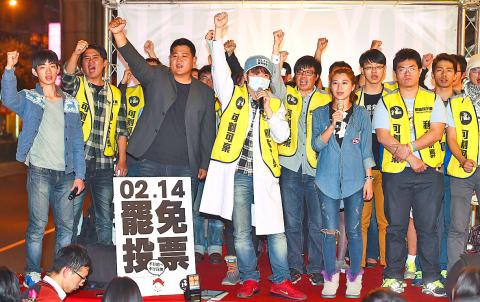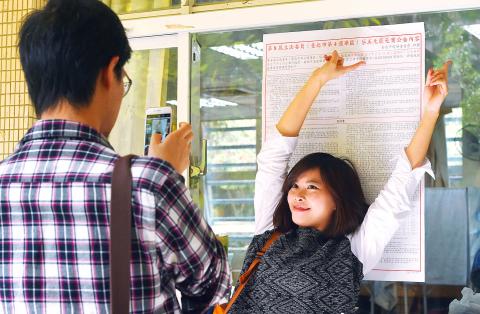Chinese Nationalist Party (KMT) Legislator Alex Tsai (蔡正元) yesterday survived a landmark recall referendum in his constituency — Taipei’s Neihu (內湖) and Nangang (南港) districts — because the poll failed to attain the required 50 percent voter turnout.
However, Tsai did not emerge unscathed, as an overwhelming majority of the 79,303 votes cast — marking turnout at 24.98 percent — supported the recall.
The Central Election Commission said that 76,737, or 97.22 percent, of the votes cast were in favor of ousting Tsai, while 2,196 people, or 2.78 percent, voted for him to stay. Just 370 votes were invalid.

Photo: Liao Chen-huei, Taipei Times
Given that there are 317,434 eligible voters in Tsai’s constituency, 158,717 voters were required to vote for the results to be valid.
The poll was the first recall in the nation since referendums in 1994 and 1995, when environmental activists failed to dislodge five KMT legislators over their support for a nuclear power plant.
The turnout threshold for referendums was raised from one-third to 50 percent by the legislature just months before the 1994 ballot, in a move widely seen as an attempt to prevent KMT legislators from losing their posts.

Photo: Liao Chen-huei, Taipei Times
The Appendectomy Project’s campaign was bolstered by scores of volunteers over its 10-month span. It ran two successful petitions last year.
At polling stations yesterday, a wide range of voters expressed their excitement that the recall election had been realized.
“I am very happy and excited because I am witnessing history — this is the first time we have been able to vote in a recall election,” said Victor Chen (陳立揚), a student at National Chiao Tung University, who returned from Hsinchu to vote.
“I am here today as a citizen to participate in the exercise of my power to recall,” a middle-aged woman surnamed Chiu (邱) said. “I think it is great that young people have been able to demonstrate that we have this power, and I want to encourage their efforts.”
Of three campaigns launched by the Appendectomy Project, the one targeting Tsai was the only one to reach its final phase, as petitions to recall KMT legislators Wu Yu-sheng (吳育昇) and Lin Hung-chih (林鴻池) both failed to draw support from at least 13 percent of voters from their respective constituencies.
Several hundred people trickled into the Appendectomy Project’s headquarters in Neihu yesterday evening to offer their support.
They said the campaign’s failure highlighted the need for a major overhaul of recall regulations, adding that the “largely unattainable” thresholds for voter turnout and the 30-day limit for petitions blocked voters from exercising their rights.
Appendectomy Project spokesman Lin Tzu-i (林祖儀) said the results indicated the failure of regulations, not the failure of the campaign and its more than 3,000 volunteers.
Lin said the group would continue campaigning for reform of the Civil Servants Election and Recall Act (公務人員選舉罷免法), and announced the group’s commitment to long-term efforts to promote direct democracy.
“Alex Tsai might be the archvillain now, but there are countless Alex Tsais out there,” Lin said.
Tsai called the results of the recall referendum “a great victory of democracy and rule of law.”
He added that the recall was initiated by a “political scam gang and professional students” and was “utterly despised by the public.”
“The number of votes cast was not even on par with those received by my opponents in the past election, which is a total embarrassment [to campaigners],” he added.
When asked by reporters about the recall threshold, Tsai said people might have different views.
He added that the number of votes to recall an official should have to top the number cast to elect them.
“That would require at least 120,000 votes to recall me,” he said.
Additional reporting by Alison Hsiao and Abraham Gerber

INVESTIGATION: The case is the latest instance of a DPP figure being implicated in an espionage network accused of allegedly leaking information to Chinese intelligence Democratic Progressive Party (DPP) member Ho Jen-chieh (何仁傑) was detained and held incommunicado yesterday on suspicion of spying for China during his tenure as assistant to then-minister of foreign affairs Joseph Wu (吳釗燮). The Taipei District Prosecutors’ Office said Ho was implicated during its investigation into alleged spying activities by former Presidential Office consultant Wu Shang-yu (吳尚雨). Prosecutors said there is reason to believe Ho breached the National Security Act (國家安全法) by leaking classified Ministry of Foreign Affairs information to Chinese intelligence. Following interrogation, prosecutors petitioned the Taipei District Court to detain Ho, citing concerns over potential collusion or tampering of evidence. The

Seventy percent of middle and elementary schools now conduct English classes entirely in English, the Ministry of Education said, as it encourages schools nationwide to adopt this practice Minister of Education (MOE) Cheng Ying-yao (鄭英耀) is scheduled to present a report on the government’s bilingual education policy to the Legislative Yuan’s Education and Culture Committee today. The report would outline strategies aimed at expanding access to education, reducing regional disparities and improving talent cultivation. Implementation of bilingual education policies has varied across local governments, occasionally drawing public criticism. For example, some schools have required teachers of non-English subjects to pass English proficiency

‘FORM OF PROTEST’: The German Institute Taipei said it was ‘shocked’ to see Nazi symbolism used in connection with political aims as it condemned the incident Sung Chien-liang (宋建樑), who led efforts to recall Democratic Progressive Party (DPP) Legislator Lee Kun-cheng (李坤城), was released on bail of NT$80,000 yesterday amid an outcry over a Nazi armband he wore to questioning the night before. Sung arrived at the New Taipei City District Prosecutors’ Office for questioning in a recall petition forgery case on Tuesday night wearing a red armband bearing a swastika, carrying a copy of Adolf Hitler’s Mein Kampf and giving a Nazi salute. Sung left the building at 1:15am without the armband and apparently covering the book with a coat. This is a serious international scandal and Chinese

TRADE: The premier pledged safeguards on ‘Made in Taiwan’ labeling, anti-dumping measures and stricter export controls to strengthen its position in trade talks Products labeled “made in Taiwan” must be genuinely made in Taiwan, Premier Cho Jung-tai (卓榮泰) said yesterday, vowing to enforce strict safeguards against “origin laundering” and initiate anti-dumping investigations to prevent China dumping its products in Taiwan. Cho made the remarks in a discussion session with representatives from industries in Kaohsiung. In response to the US government’s recent announcement of “reciprocal” tariffs on its trading partners, President William Lai (賴清德) and Cho last week began a series of consultations with industry leaders nationwide to gather feedback and address concerns. Taiwanese and US officials held a videoconference on Friday evening to discuss the